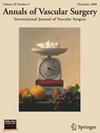Trainee Perception of Virtual Interviews and Associations of Virtual Engagement with Vascular Surgery Culture and Community
IF 1.4
4区 医学
Q3 PERIPHERAL VASCULAR DISEASE
引用次数: 0
Abstract
Background
In recent years, the vascular surgery community has increased the utilization of virtual interviews and virtual engagement or use of online technologies for educational, networking, and mentorship activities. This study evaluates trainee preferences of virtual interviews and associations of virtual engagement with wellness.
Methods
Deidentified data were collected from a confidential, voluntary survey of residents and fellows in vascular surgery programs administered following the 2023 Vascular Surgery In-Training Examination (VSITE). A 5-point Likert scale measured resident perceptions of virtual interviews and virtual interactions. Multivariable logistic regression modeling was used to compare factors associated with preference of virtual interviews and virtual engagement.
Results
Of 521 trainees who participated in the survey (78.2% response rate), 60.8% were male, 48.8% were non-White, and there was a relatively equal distribution among training years. Only 41.2% of the trainees reported they would have preferred virtual interviews in retrospect. These trainees were more likely to be non-White and in postgraduate years one or 2 (P = 0.03 and P < 0.001, respectively). Overall, 83.5% of trainees were classified as virtually engaged. These trainees were more likely to be male (86.5% vs. 78.9%, P = 0.033) and had 2.8 increased odds of satisfaction with time for their personal lives (P < 0.001).
Conclusion
While most trainees surveyed reported a preference for in-person interviews, trainees report that virtual interviews are reflective of program culture. Additionally, trainees who were virtually engaged were more likely to report satisfaction with their time for their personal lives. Our study supports continued hybrid approaches to interviews and trainee engagement.
求助全文
约1分钟内获得全文
求助全文
来源期刊
CiteScore
3.00
自引率
13.30%
发文量
603
审稿时长
50 days
期刊介绍:
Annals of Vascular Surgery, published eight times a year, invites original manuscripts reporting clinical and experimental work in vascular surgery for peer review. Articles may be submitted for the following sections of the journal:
Clinical Research (reports of clinical series, new drug or medical device trials)
Basic Science Research (new investigations, experimental work)
Case Reports (reports on a limited series of patients)
General Reviews (scholarly review of the existing literature on a relevant topic)
Developments in Endovascular and Endoscopic Surgery
Selected Techniques (technical maneuvers)
Historical Notes (interesting vignettes from the early days of vascular surgery)
Editorials/Correspondence

 求助内容:
求助内容: 应助结果提醒方式:
应助结果提醒方式:


